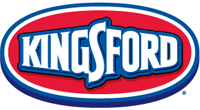Kingsford Charcoal
 |
|
| Product type | Charcoal |
|---|---|
| Owner | The Clorox Company |
| Country | U.S. |
| Introduced | 1920s |
| Website | kingsford.com |
Kingsford is a brand of charcoal used for grilling, along with related products. The brand is owned by The Clorox Company. Currently, the Kingsford Products Company remains the leading manufacturer of charcoal in the US, enjoying 80 percent market share. More than 1 million tons of wood scraps are converted into charcoal briquets annually.
Ford Motor Company sold more than one million Ford Model Ts in 1919, and each of those Model Ts used 100 board feet of timber for the parts such as frame, dashboard, steering wheels and wheels. Because of the amount of timber that had to be used in the cars, Henry Ford decided he wanted to produce his own supply. He enlisted the help of Edward G. Kingsford, a real estate agent in Michigan, to find him a supply of timber. Coincidentally, Kingsford’s wife was a cousin of Ford making the partnership a reality. In the early 1920s, Ford acquired large timberland in Iron Mountain, Michigan, and built a sawmill and parts plant there in neighboring area at Kingsford, Michigan. Henry Ford was always looking for new ways to combine resources. The mill and plants produced sufficient parts for the car but many wastes were generated too such as stumps, branches and sawdust. Ford suggested that all wood scraps were to be processed into charcoal.
With the help of an University of Oregon chemist, Orin Stafford who had invented a method for making pillow-shaped lumps of fuel from sawdust and mill waste combined with tar and bound together with cornstarch. He called the lumps “charcoal briquettes.” Thomas Edison designed the briquette factory next to the sawmill, and Kingsford ran it. It was a model of efficiency, producing 610 pounds of briquettes for every ton of scrap wood and sold only through Ford dealerships. Ford then named the new business Ford Charcoal and changed the name of the charcoal blocks to “briquets”. At the beginning, the charcoal was sold to meat and fish smokehouses, but supply exceeded demand.
By the mid-1930s, Ford was marketing “Picnic Kits” containing charcoal and portable grills directly from Ford dealerships, capitalizing on the link between motoring and outdoor adventure that his own Vagabond travels popularized. “Enjoy a modern picnic,” the package suggested. “Sizzling broiled meats, steaming coffee, toasted sandwiches.” It wasn’t until after World War II that backyard barbecuing took off, thanks to suburban migration, the invention of the Weber grill and the marketing efforts. An investment group bought Ford Charcoal in 1951 and renamed it to Kingsford Charcoal in honor of Edward G. Kingsford and the factory's home-base name and took over the operations. The plant was later acquired by Clorox in 1973.
...
Wikipedia
